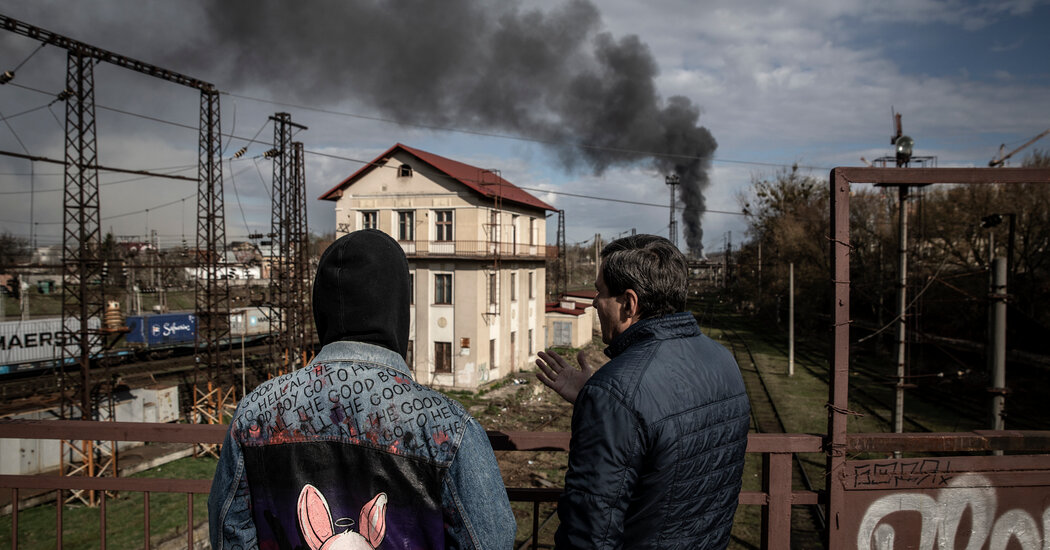
LVIV, Ukraine — Russian missiles struck Lviv on Monday, killing at least seven people in the first reported deaths of the war in the western city, where hundreds of thousands of displaced people have fled to escape the fierce fighting in other parts of Ukraine.
The head of Lviv’s military administration, Maksym Koztyskyy, said three missiles hit empty military warehouses while a fourth hit a garage, killing and injuring civilians. He did not say whether all the casualties were from the garage strike, which hit a few hundred feet from a set of railway tracks.
“If the garage was the ultimate target, maybe they were aiming at the railway station,” he said. “There are no longer any safe or unsafe locations.”
The head of Ukraine’s railway service, Oleksandr Pertsovskyi, said he had no proof that the attack was aimed at the railway, which has some facilities near military sites.
For many in Lviv, the attacks opened a new page in the conflict: a realization that even hundreds of miles from the front lines, this city known as a tourist destination and the cultural capital of Ukraine could be attacked at any time.
“We have to be vigilant because the enemy is getting more and more atrocious,” said Lviv’s mayor, Andriy Sadovyi. “You have to protect yourself,” he said, pleading with residents to go to bomb shelters when air raid sirens sounded.
At one of the impact sites, gray smoke billowed from what remained of the red roof of a long, concrete garage with a sign reading “carwash” and “tire replacement.” The hole in the roof indicated that the building, which overlooks railway tracks in a ravine below, had suffered a direct hit from a missile. As another air raid siren sounded, firefighters tried to extinguish the flames while ambulances ferried away the wounded.
A few streets away from the burning building, a resident hung her laundry out to dry while others walked small dogs wearing sweaters.
As the garage burned, a train from the eastern city of Dnipro rumbled slowly by on its way to the nearby Lviv train station, carrying passengers fleeing the fighting in Dnipro and headed to the city of Truskavets in western Ukraine. It stopped briefly in Lviv and one of the conductors said he had tried to reassure the passengers as they started hearing about the airstrikes by phone.
“People were getting information from their relatives in Lviv” about the attacks, said the conductor, Fedir, leaning out of the railway car to talk before it pulled away. “They weren’t panicked, but they were worried. I told them to stay calm,” he added, asking that he be identified by his first name only.
Inside the train station, Anna Khrystiuk, a volunteer staffing an information desk for displaced people flooding into the train station, said most people had ignored the air raid siren until the first explosion.
“We told people to go to the shelter but they didn’t listen to us,” said Ms. Khrystiuk, 23. But with the sound of the explosion, she said, passengers ran to the underground level of the station that serves as a shelter.
“It was panic,” she said. “Many people came from Kharkiv and other places and they were so afraid of rockets already. They thought that it was safe to stay here.”. While they were underground, they heard three more explosions.
Russia-Ukraine War: Key Developments
“Many people cried,” she said. “We told them to keep calm and everything would be OK.”
Orest Maznin, a police officer, said he had been driving to work past the garage when the missile struck and he narrowly escaped being hit by shrapnel. His car windshield had a large hole from the impact of a piece of metal.
He said he and other drivers slammed on the brakes and took cover near their cars when the missiles struck.
“It happened too quickly for me to be afraid,” said Mr. Maznin, who joined the police force just six months ago.
In addition to the seven killed, Mr. Kozytskyy said 11 people were injured, but that toll could rise as rescue workers cleared rubble from the impact site. At least two people were critically injured, and a child was among those with more minor injuries.
Mr. Kozytskyy said the missiles were launched by aircraft coming from the direction of the Caspian Sea.
The Lviv mayor said earlier on Monday that five missiles were fired.
A month ago, Russian missiles struck a military base outside the city that was used extensively for training Ukrainian forces. And Russian missile attacks hit a fuel storage site and a tank repair facility in Lviv in late March.
“The world knows that Lviv is the biggest hub for those fleeing from shelling and over 100 embassies moved to Lviv,” said Mr. Sadovyi, the mayor. “This is an attempt to intimidate.”




